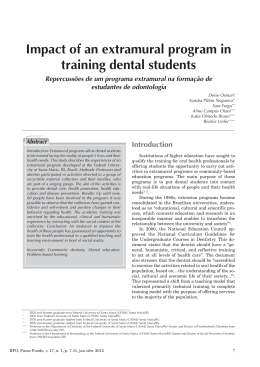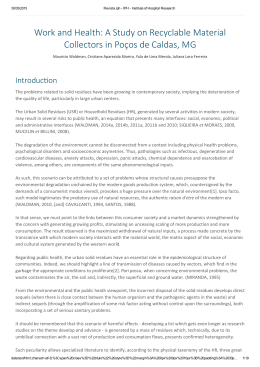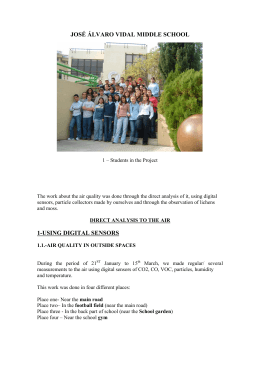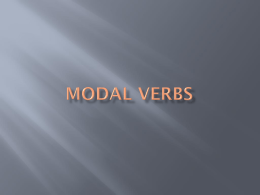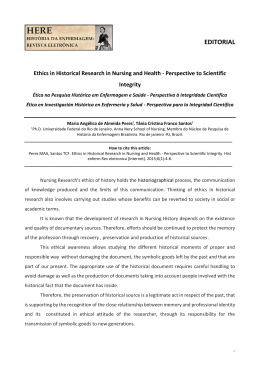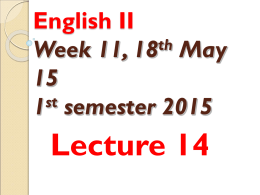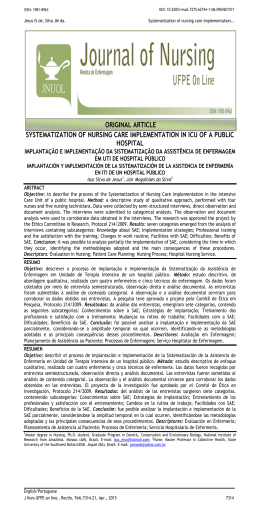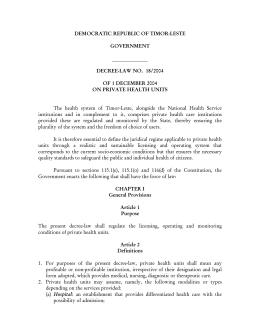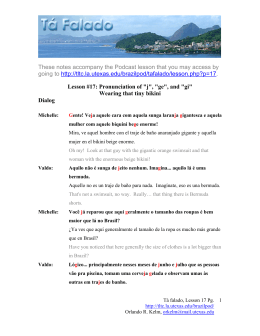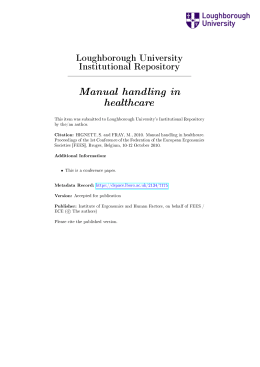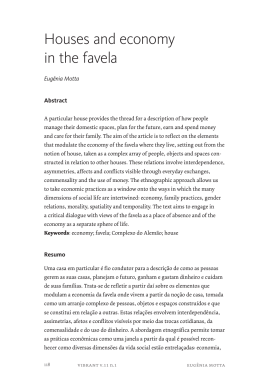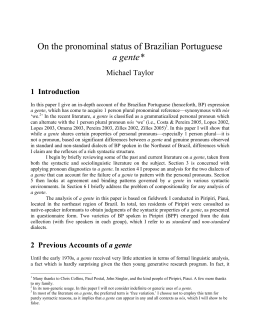1 Daily life OF garbage collectors: CHALLENGES AND ACHIEVEMENTS1 PRUNZEL, Marizani 2; ARAUJO, Pâmela V.2; SEVERO, Paola2; BACKES, Dirce S.3 MARZARI,Carla K.4 ABSTRACT This article aims to understand the garbage collectors day-to-day in the city of Santa Maria / RS and the environment which they are inserted in. The research was developed through the qualitative method, specifically a case study, where visits were made in the west region of Santa Maria, where some garbage collectors live, and in pursuit of greater knowledge about the thematic interviews were made directly with the collectors in the central region, where they perform their profession, followed by the researchers’ analysis. The social and work environment of these professionals was known, enabling a greater understanding of this reality, thus seeking improvements in the quality of life of the working class, through health promotion actions on the part of the multidisciplinary team, especially nursing. Keywords: Collectors, Environment, Quality of life; Nursing. 1. INTRODUCTION Throughout human history the waste represented everything that has no value, bringing the concept that it should be put out of homes, industries and businesses for someone to "take it away" (1). In this context, there is the arising of the garbage collectors population, as a phenomenon on the scale of social exclusion installed in society caused by the established pattern of consumption and the generation of urban solid waste. (2) In 2006, the National Movement of Recyclable Materials (Movimento Nacional de Catadores de Materiais Recicláveis) points to a number of about eight hundred thousand collectors, organized into cooperatives or associations, demonstrating the legitimacy of the activity (3).The great increase in this activity comes against the lack of opportunities in the work market, and so the trash becomes a "good" for these scavengers. In regard to the respect to the concept of health it is clearly shown as the result of living conditions and the environment. At the same time they degrade the man, his quality of life and their health, development standards adopted have helped environmental degradation through overgrazing of natural resource s and pollution, which in turn, have generated large impacts on health and quality of life (5). Regarding the environmental issue and the actions of life quality maintenance, nursing is deeply connected with this subject. This connection comes from the actions of health promotion, which through scientific theoretical knowledge developed during the graduation the nurse is able to guide the public about health conditions and the reality which they are inserted as garbage collectors. Given the growing demand for this professional class, and the vulnerability of their working conditions and quality of life, this study is justified by the relevance of the theme and 2 aims to know the reality of garbage collectors in Santa Maria and the environment they are inserted in. 2. Methodology This is a case study, developed in the community Alto da Boa Vista, located in the west of Santa Maria, which has a population of approximately 26,000 residents most of them living in vulnerable social conditions. This work was carried out with systematic steps, between the months of August to December 2010 distributed as follows: observation visits to the community were conducted in which we were told by the teachers to observe the local environmental conditions, i.e. housing conditions, conditions of the recreation area, sanitation conditions, among others. In the quest for deeper knowledge about the working conditions of the subject, interviews were conducted with five garbage collectors in their working hours, randomly chosen by a question: How is your job as a garbage collector? For the process of gathering information and community-based interventions, we observed the ethical criteria established by Resolution 196/96 from the Ministry of Health to preserve anonymity, the subjects' statements throughout the paper, were identified by the letter "C", and followed by a numeric digit. RESULTS AND DISCUSSIONS The collectors’ routine daily begins in the morning. The vast majority, around 07h30min is already on the streets collecting the materials. This, however, happens in a tiring way as many of them live far from the center, where the waste concentration is greater, as much as transporting the material collected. That which is collected are recyclables as plastic bottles, cardboard, tin, among others, and after they are taken into established sites to be sold, where they guarantee the maintenance of the home. Because they spend too much time away from their homes, they carry their meals on the street, and often receive donations of food from downtown population, as realized in the following quote: “Passo o dia inteiro aqui, mas agente não fica sem comer meu tio traz de casa e a gente ganha muita coisa do pessoal aqui, tem muita gente boa aqui no centro”. "I spend all day here, but we do not go on without eating, my uncle brings from home and we get a lot of things from the people here, there are good people here in the center."C1 However, the odds do not hinder the work and, most of them, feel happy, with this profession, and are also aware of the importance of their work for the environment and society, as noted with the following statements: I like to work, got used to, would not leave it."Gosto de trabalhar me acostumei, não deixaria.Não gostaria de outro serviço, para ser mandado, e minha família toda trabalha na reciclagem.” Would not like some other job, to be commanded, and my whole family works with recycling. "C1 “A Santa Maria tem que ficar limpa” "Santa Maria has to be clean" C2 The issue has social relevance from the large number of collectors of recyclable materials throughout the country. Some studies have warned that in the late nineties, there 3 were 45 000 children and adolescents living and working in dump yards. This brings us to the collectors’ health conditions as well as the environment in which they live. Knowing the environment experienced by the garbage collectors The environment in which the subjects are inserted, takes us back to the beginnings with Florence Nightingale's Environmentalist Theory which corroborates the theme. The control of the environment emerges as the main concept in the writings of Florence, considering the conditions and external influences affecting the life and development of the body that can proceed, eliminate or contribute to health, disease and death (8). In the matter of the social environment, which in the case of collectors is closely linked to psychological issues due to social exposure and cultural reflections of garbage? They face prejudice for his profession; in their majority they feel devalued by society. Devaluation and prejudice situations with the garbage collectors are expressed in the statements below: “Não dou bola mais para os ruins, dou bola para os bons. Deixei de esquentar a cabeça para essa gente que tem nojo do jeito que tu é. Uma mulher me xingou me chamou de fedorenta, na minha frente”. "I don't care about the bad people anymore, I only care about the good ones. I quit stressing my mind because of these people that loathe by the way we are. A woman called my stinky right in front of me"C2 “Tem muitas pessoas que tem preconceito, mas já estou acostumado.” "There are many people who have prejudice, but I'm used to that."C3 However, in the midst of prejudices, there are individuals who see the garbage collectors as a human being, which collects their support through garbage. FINAL REMARKS The routine of recyclable material collectors made us realize that the environment, which they are inserted requires more attention from society. During the work, we had the opportunity to experience the day-to-day and the environment in which they are integrated. Through that, we realized that there are many problems in their life conditions and the work the do, but this activity represents for most of them the only mean of survival for the home sustaining. Finally, one can consider that the objectives of our study were achieved, where we knew the garbage collectors reality and their living conditions. Those who despite not being officially recognized as a working class, are vulnerable to risks, they like what they do, and also contribute to the environment, since recycling represents and is still the best alternative for the treatment of waste. 4 REFERENCES 1. Augusto LGS, Câmara VM, Carneiro FF, Câncio J, Gouveia N. Saúde e ambiente: uma reflexão da Associação Brasileira de Pós-Graduação em Saúde Coletiva (ABRASCO). Rev. bras. Epidemiol. 2003; 6(2): 87-94. accessed on: 02 dez.2010. 2. Bursztyn, M. (Org.). (2003). No meio da rua: Nômades, excluídos e viradores. Rio de Janeiro: Garamond. access on: 12. set 2010. 3. Movimento Nacional de Catadores de Materiais Recicláveis. [Internet site]. [access on 2006 mar 03]. Available at: http://movimentonacional catadores.org. br. accessed on: 29 Nov. 2010. 4. De Oliveira Gomes, Vera Lúcia; SCHUBERT BACKES, Vânia Marli; COELHO DE SOUZA PADILHA, Maria Itayra and DE CEZAR VAZ, Marta Regina. Evolução do conhecimento científico na enfermagem: do cuidado popular à construção de teorias. Invest. educ. enferm [online]. 2007, vol.25, n.2, pp. 108-115. ISSN 0120-5307. Available at < http://www.scielo.org.co/pdf/iee/v25n2/v25n2a10.pdf > Accessed on: 02 Dec.2010. 5. IBAM, Instituto Brasileiro de Administração Municipal. (2001). Manual de gerenciamento integrado de resíduos sólidos. Rio de Janeiro: Author. Accessed on: 12. Sep. 2010. 6.Porto MFS, Juncá DCM, Gonçalves RS, Filhote MJF. Lixo, trabalho e saúde: um estudo de caso com catadores em um aterro metropolitano no Rio de Janeiro, Brasil. Cad Saúde Publica 2004; 20(6): 1503-1514. Accessed on: 29 Nov.2010. [1] Research work was carried out for partial approval of Professional Development I and Scientific Methodology Subjects, from UNIFRA Nursing course. [2] of the first academic semester of the UNIFRA Nursing course. [3] Nurse. PhD in nursing. Professor of UNIFRA Nursing course. Nurse 4.Master of Public Health. Professor of UNIFRA Nursing course.
Download
